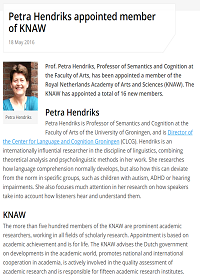Hendriks, prof. dr. Petra

Petra Hendriks is hoogleraar Semantiek en cognitie aan de Faculteit der Letteren van de RUG en directeur van het Center for Language and Cognition Groningen (CLCG). Hendriks is een internationaal invloedrijke onderzoeker in haar vakgebied, de linguïstiek. In haar werk combineert ze theoretische analyse en psycholinguïstische methodes. Ze doet onderzoek naar de betekenis van woorden en zinnen. Woorden hebben vaak meerdere betekenissen, waardoor het aantal mogelijke betekenissen voor zinnen, die opgebouwd zijn uit woorden, enorm groot wordt. Mensen merken dat vaak helemaal niet en weten meestal meteen de juiste betekenis uit te kiezen. Pas wanneer je een computer een zin laat analyseren, merk je hoeveel betekenissen een zin eigenlijk heeft.
Hendriks onderzoekt ook hoe de ontwikkeling van taalbegrip normaalgesproken verloopt, en hoe die kan afwijken bij bepaalde groepen zoals kinderen met autisme, ADHD of gehoorstoornissen. Zo kan worden vastgesteld welke grammaticale kennis nodig is voor optimale communicatie.
Eerder in het nieuws

2024
2023
2022
2021
2020
2019
2018
2017
2016
2015
2014
| Laatst gewijzigd: | 09 juni 2023 20:36 |
